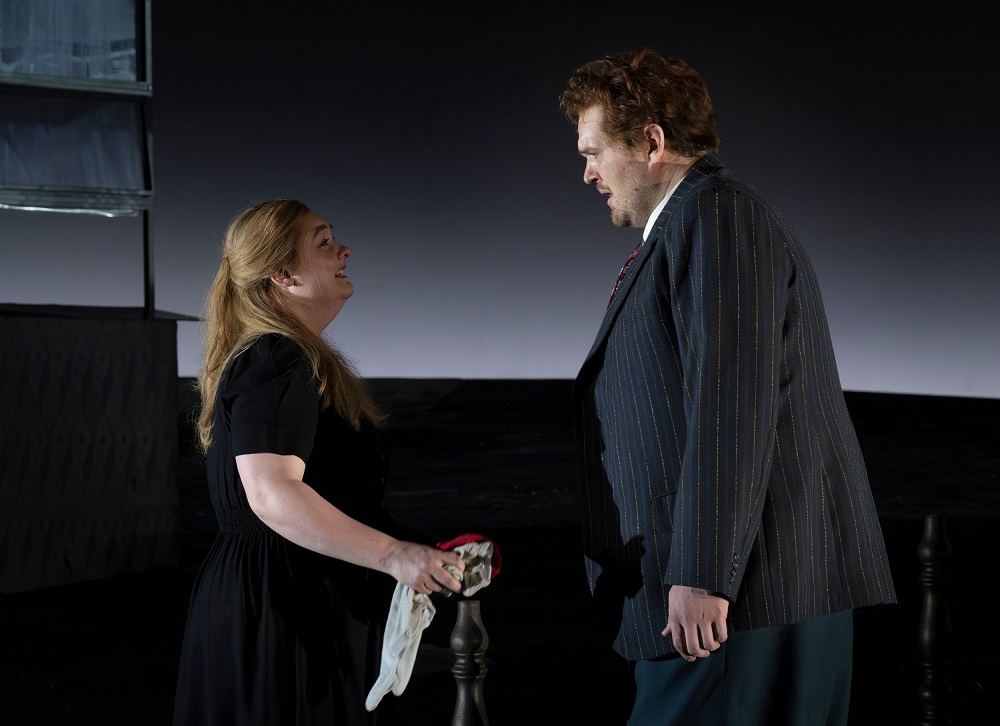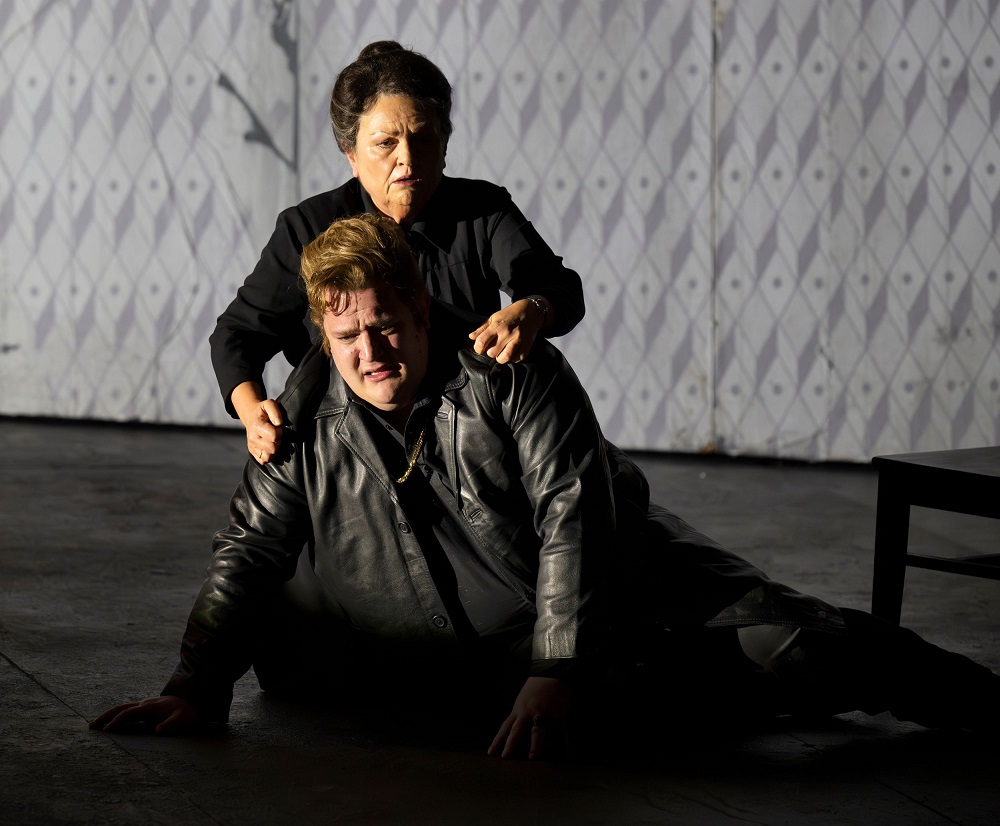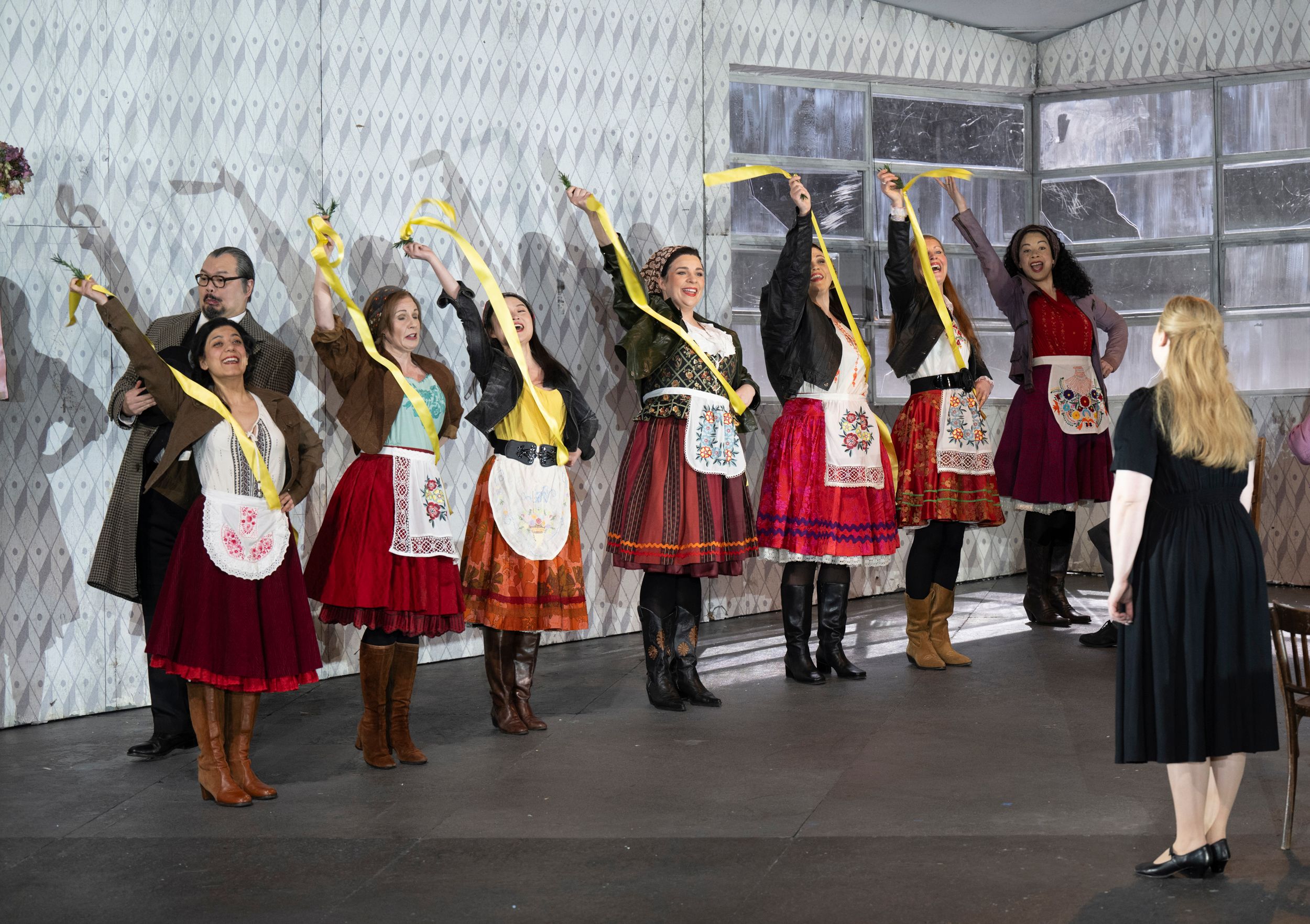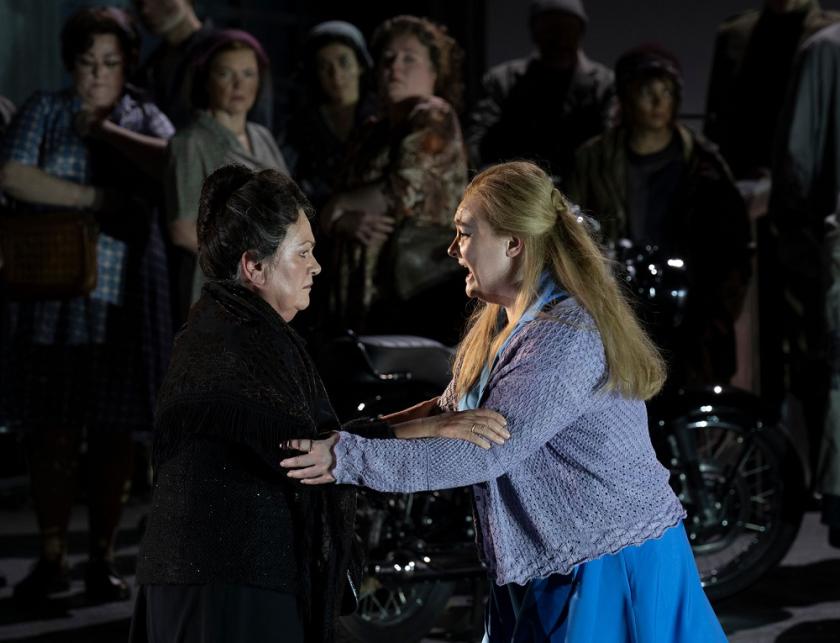Face scarred, baby murdered – both crimes committed by those closest to her – village girl Jenůfa rises again with extraordinary strength of will. Of all affirmative endings in opera, Janáček’s has to be the most moving, and all the more so in this revival of David Alden’s clear and perceptive production as Jennifer Davis uses the power behind her beautiful lyric soprano to go the extra mile, as she always does.
The central battle of female energies is as strong as ever I’ve seen it, even if the balance is slightly shifted. Susan Bullock, in the role of Jenůfa’s stepmother or Kostelnička (Village Sacristan) which should have been hers in the last, 2016, ENO revival, now has to focus her dramatic vocal forces with all her might. That suggests a woman driven by a hard life and a bad marriage to shows of strength which don’t come naturally to her: Jenůfa is the one who, over the course of the action, becomes truly strong (pictured below: Davis with Richard Trey Smagur as Laca in the final scene).  Alden’s very open stage in Charles Edwards’ spare designs evoking a late communist-era industrialised rural society, which can make vocal projection difficult, offers a wide, expressionist perspective with giant shadows (imaginative lighting by Adam Silverman) on the small village house where the Kostelnička keeps the girl confined during and after her pregnancy by feckless, privileged Števa.
Alden’s very open stage in Charles Edwards’ spare designs evoking a late communist-era industrialised rural society, which can make vocal projection difficult, offers a wide, expressionist perspective with giant shadows (imaginative lighting by Adam Silverman) on the small village house where the Kostelnička keeps the girl confined during and after her pregnancy by feckless, privileged Števa.
This central act works to show the characters in isolation, seated or slumped poles apart. Bullock’s beautiful soft singing draws us in to the tortured psyche of a woman who takes a terrible decision to save, as she sees it, two adult lives from ruin. This Kostelnička is no sacred monster, and she’s seen to start paying the price inwardly the minute the deed is done. The moments of despair for both women are etched unforgettably in realistic physical gestures, challenged to the limits by Alden's daring direction.  The weak men playing their part in the catastrophe are nevertheless colossal both vocally and physically. The voice of John Findon, great Wagner tenor in the making, rings out in the vast space, even if the role of playboy isn't his natural element (in any case Števa is a big softie, as we find out in Act Two - pictured above, Findon with Bullock); American tenor Richard Trey Smagur is a shambling hulk of a Laca, whose tenderness to the woman he loves soon emerges.
The weak men playing their part in the catastrophe are nevertheless colossal both vocally and physically. The voice of John Findon, great Wagner tenor in the making, rings out in the vast space, even if the role of playboy isn't his natural element (in any case Števa is a big softie, as we find out in Act Two - pictured above, Findon with Bullock); American tenor Richard Trey Smagur is a shambling hulk of a Laca, whose tenderness to the woman he loves soon emerges.
All the smaller roles are perfectly taken, and the chorus hits the powerful mark as usual in the face of all the current threats to its integrity, executing the order-in-chaos revelries of Act One and the traditional ritual for Jenůfa and Laca’s wedding (pictured below), both perfectly choreographed by Maxine Braham.  Conductor Keri-Lynn Wilson makes a welcome return to ENO, and would be an excellent music director if it were worth the candle. What the orchestral playing occasionally lacks in razor-sharp rhythmic precision it gains in heft, with some grotesque and baleful details I hadn’t noticed before in Janáček’s various score. The timing of the many stretched, intense silences is perfect; in the last, before the unexpected resolution of the opera, you could sense the audience collectively holding its breath. Rattle's concert performance earlier this year revealed many beauties, but the opera house is always where the drama hits hardest. If you’re new to opera and come from a love of theatre, I can’t think of a more powerful introduction. Catch it while you can, or see it again.
Conductor Keri-Lynn Wilson makes a welcome return to ENO, and would be an excellent music director if it were worth the candle. What the orchestral playing occasionally lacks in razor-sharp rhythmic precision it gains in heft, with some grotesque and baleful details I hadn’t noticed before in Janáček’s various score. The timing of the many stretched, intense silences is perfect; in the last, before the unexpected resolution of the opera, you could sense the audience collectively holding its breath. Rattle's concert performance earlier this year revealed many beauties, but the opera house is always where the drama hits hardest. If you’re new to opera and come from a love of theatre, I can’t think of a more powerful introduction. Catch it while you can, or see it again.















Add comment